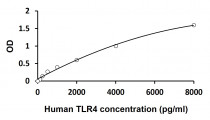ARG81398
Human TLR4 ELISA Kit
Human TLR4 ELISA Kit for ELISA and Human
Overview
| Product Description | ARG81398 Human TLR4 ELISA Kit is an Enzyme Immunoassay kit for the quantification of Human TLR4 in serum, plasma and cell culture supernatants |
|---|---|
| Tested Reactivity | Hu |
| Tested Application | ELISA |
| Specificity | The following recombinant Human proteins exhibited no cross-reactivity or interference: IL-1β, IL-2, IL-4, IL-5, IL-6, IL-8, IL-10, IL-15, IFN gamma, TLR1 and TNF alpha. This human TLR4 ELISA Kit showed less than 6% reactivity with recombinant human TLR1, TLR2 and TLR3 proteins. |
| Target Name | CD284 / TLR4 |
| Conjugation | HRP |
| Conjugation Note | Read at 450 nm. |
| Sensitivity | 25 pg/ml |
| Sample Type | Serum, plasma and cell culture supernatants |
| Standard Range | 125 - 8000 pg/ml |
| Sample Volume | 100 µl |
| Precision | Intra-Assay CV: 6% Inter-Assay CV: 11% |
| Alternate Names | CD284; CD antigen CD284; ARMD10; hToll; TLR-4; TOLL; Toll-like receptor 4 |
Application Instructions
| Assay Time | ~ 3 hours |
|---|
Properties
| Form | 96 well |
|---|---|
| Storage Instruction | Store the kit at 2-8°C. Keep microplate wells sealed in a dry bag with desiccants. Do not expose test reagents to heat, sun or strong light during storage and usage. Please refer to the product user manual for detail temperatures of the components. |
| Note | For laboratory research only, not for drug, diagnostic or other use. |
Bioinformation
| Database Links | |
|---|---|
| Gene Symbol | TLR4 |
| Gene Full Name | toll-like receptor 4 |
| Background | The protein encoded by this gene is a member of the Toll-like receptor (TLR) family which plays a fundamental role in pathogen recognition and activation of innate immunity. TLRs are highly conserved from Drosophila to humans and share structural and functional similarities. They recognize pathogen-associated molecular patterns that are expressed on infectious agents, and mediate the production of cytokines necessary for the development of effective immunity. The various TLRs exhibit different patterns of expression. This receptor has been implicated in signal transduction events induced by lipopolysaccharide (LPS) found in most gram-negative bacteria. Mutations in this gene have been associated with differences in LPS responsiveness. Multiple transcript variants encoding different isoforms have been found for this gene. [provided by RefSeq, Jan 2012] |
| Function | Cooperates with LY96 and CD14 to mediate the innate immune response to bacterial lipopolysaccharide (LPS). Acts via MYD88, TIRAP and TRAF6, leading to NF-kappa-B activation, cytokine secretion and the inflammatory response. Also involved in LPS-independent inflammatory responses triggered by free fatty acids, such as palmitate, and Ni(2+). Responses triggered by Ni(2+) require non-conserved histidines and are, therefore, species-specific. In complex with TLR6, promotes sterile inflammation in monocytes/macrophages in response to oxidized low-density lipoprotein (oxLDL) or amyloid-beta 42. In this context, the initial signal is provided by oxLDL- or amyloid-beta 42-binding to CD36. This event induces the formation of a heterodimer of TLR4 and TLR6, which is rapidly internalized and triggers inflammatory response, leading to the NF-kappa-B-dependent production of CXCL1, CXCL2 and CCL9 cytokines, via MYD88 signaling pathway, and CCL5 cytokine, via TICAM1 signaling pathway, as well as IL1B secretion. [UniProt] |
| Highlight | Related products: TLR4 antibodies; TLR4 ELISA Kits; Related news: Detecting exosomal HMGB1 for ICD research New ELISA data calculation tool: Simplify the ELISA analysis by GainData |
| PTM | N-glycosylated. Glycosylation of Asn-526 and Asn-575 seems to be necessary for the expression of TLR4 on the cell surface and the LPS-response. Likewise, mutants lacking two or more of the other N-glycosylation sites were deficient in interaction with LPS. [UniProt] |
Images (1) Click the Picture to Zoom In
| Title | Download Link |
|---|---|
| ARG81398 Human TLR4 ELISA Kit User's manual |
 Download Download
|






